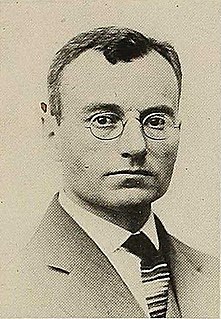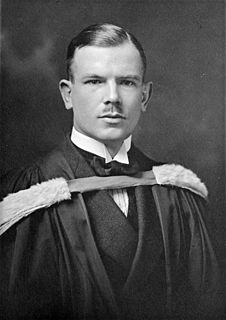A Quote by Carl L. Becker
No one can deny that much of our modern advertising is essentially dishonest; and it can be maintained that to lie freely and all the time for private profit is not to abuse the right of free speech, whether it is a violation of the law or not. But again the practical question is, how much lying for private profit is to be permitted by law?
Related Quotes
This [anti-terrorism bill] is a violation of the First Amendment right to free speech and the Fourth Amendment protection of private property... Some of these provisions place more power in the hands of law enforcement than our Founding Fathers could have dreamt and severely compromises the civil liberties of law-abiding Americans. This bill, while crafted with good intentions, is rife with constitutional infringements I could not support.
Medicine, as we are practising it, is a luxury trade. We are selling bread at the price of jewels... Let us take the profit, the private economic profit, out of medicine, and purify our profession of rapacious individualism... Let us say to the people not 'How much have you got?' but 'How best can we serve you?
Capitalism as a social order and as a creed is the expression of the belief in economic progress as leading toward the freedom and equality of the individual in a free and open society. Marxism expects this society to result from the abolition of private profit. Capitalism expects the free and equal society to result from the enthronement of private profit as supreme ruler of social behavior.
All men, in the abstract, are just and good; what hinders them, in the particular, is, the momentary predominance of the finite and individual over the general truth. The condition of our incarnation in a private self, seems to be, a perpetual tendency to prefer the private law, to obey the private impulse, to the exclusion of the law of the universal being.
For better or worse, we are the Court of Appeals for the Hollywood Circuit. Millions of people toil in the shadow of the law we make, and much of their livelihood is made possible by the existence of intellectual property rights. But much of their livelihood - and much of the vibrancy of our culture - also depends on the existence of other intangible rights: The right to draw ideas from a rich and varied public domain, and the right to mock, for profit as well as fun, the cultural icons of our time.
Much of the Constitution is remarkably simple and straightforward - certainly as compared to the convoluted reasoning of judges and law professors discussing what is called 'Constitutional law,' much of which has no basis in that document....The real question [for judicial nominees] is whether that nominee will follow the law or succumb to the lure of 'a living constitution,' 'evolving standards' and other lofty words meaning judicial power to reshape the law to suit their own personal preferences.
We hold that the ownership of private property is the right and privilege of every American citizen and is one of the foundation stones upon which this nation and its free enterprise system has been built and has prospered. We feel that private property rights and human rights are inseparable and indivisible. Only in those nations that guarantee the right of ownership of private property as basic and sacred under their law is there any recognition of human rights.
I think the private sector for the most part, the vast majority of employers in America, they wake up in the morning, and they have a bottom line. This is how much they make, this is how much their expenses are; they certainly need to break even just to stay in business, and they need to make a profit in order to survive long-term.
One of the things about being a law student is that the academic discipline of law is very often removed from the practical reality of law. How to complain, who to complain to, and whether or not you even need to invoke the law is very different in the real world from how it's examined in the lecture theatre.
We shall never understand the natural environment until we see it as a living organism. Land can be healthy or sick, fertile or barren, rich or poor, lovingly nurtured or bled white. Our present attitudes and laws governing the ownership and use of land represent an abuse of the concept of private property.... Today you can murder land for private profit. You can leave the corpse for all to see and nobody calls the cops.








































